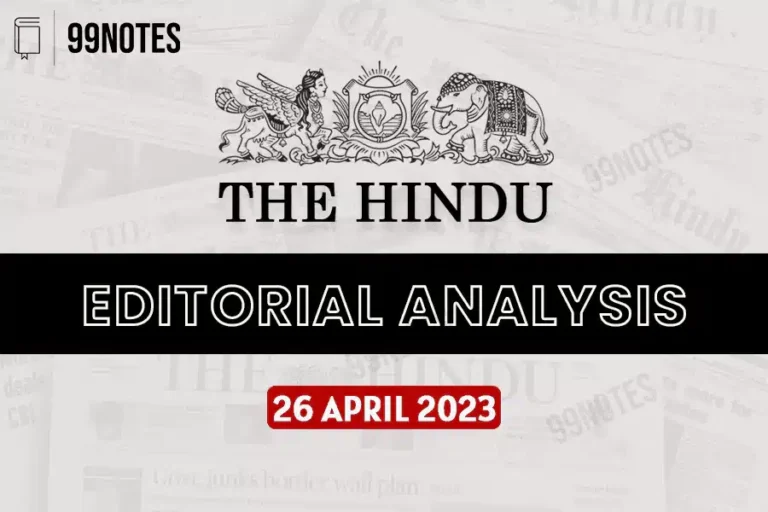23 January 2024 : The Hindu Editorial Notes PDF
The Hindu Editorial
23-January-2024
1. Tax contribution by States needs to be revisited.
| Topic: GS3 – Indian Economy – Issues relating to mobilization of resources.
Relevant for UPSC as it explores the evolution of Finance Commission formulas, proposing the inclusion of GST and petroleum consumption for efficiency. |
| Context: |
|
Background: Finance Commission’s Role
- The Finance Commission recommends distribution formulas for State shares in Union tax revenue.
- States argue for higher shares based on their perceived higher contributions to Union tax revenue.
Evolution of Distribution Formulas:
- Till the 10th Finance Commission, tax contribution had limited weight in distribution formulas.
- Post the 10th Finance Commission, tax contribution was excluded, and population became a dominant factor.
- Shift towards incorporating equity indicators with more than 75% weight since the 10th Finance Commission.
Efficiency Indicators: Tax Effort and Fiscal Discipline:
- Post-2000, distribution formulas included tax effort and fiscal discipline as efficiency indicators.
- States advocate for increased weightage for efficiency indicators in distribution formulas.
GST as a Game-Changer:
- GST, being a consumption-based destination tax, provides stability and accurate estimation of tax contribution by States.
- Proposal to include GST contribution as an efficiency indicator due to its uniform structure and stability.
Petroleum Consumption as an Indicator:
- Petroleum consumption, outside GST, is suggested as another indicator of tax contribution.
- Relative shares of petroleum consumption stable over time, reflecting the State’s contribution to Union excise duties.
Rationale for Inclusion:
- Relative GST contribution and petroleum consumption reflect differences in incomes, both personal and corporate.
- Proposal for the 16th Finance Commission to consider these ratios with a suggested weightage of at least 33%.
Conclusion: Towards a More Inclusive Distribution Formula:
- Inclusion of GST and petroleum consumption in the distribution formula deemed essential for fairness and accuracy.
- These measures are seen as representative of States’ contributions to the national exchequer and indicators of efficiency.
| PYQ: How is the Finance Commission of India constituted? What do you know about the terms of reference of the recently constituted Finance Commission? Discuss. (250 words/15m) (UPSC CSE (M) GS-2 2018) |
| Practice Question: Discuss the evolution of Finance Commission distribution formulas in India and evaluate the proposal to include GST and petroleum consumption as efficiency indicators. (150 words/10 m) |
2. The idea of one nation, one election is against federalism.
| Topic: GS2 – Indian polity – Federal structure.
Crucial for UPSC as it delves into legal, constitutional, and practical aspects of ‘One Nation, One Election,’ a significant governance proposal. |
| Context: |
|
Background: One Nation, One Election Committee
- Union Government formed ‘High Level Committee on One Nation, One Election’ in September 2023, chaired by Ramnath Kovind.
- Committee seeks views from political parties, public, and jurists on synchronizing Lok Sabha and State Assembly elections.
Legal Issues: Potential Alteration of Democratic Fundamentals
- Concerns raised about potential constitutional and legal issues in favor of common election schedule.
- Fear that Committee may overlook these concerns, prompting reliance on the Supreme Court for resolution.
Feasibility Arguments: Cost and Governance Downtime
- Proponents argue for cost reduction, citing the 2014 general elections’ ₹3,870 crore expenditure.
- Mention of Model Code of Conduct causing governance downtime, advocates of common elections aim for efficiency.
Opposition’s Perspective: Logical and Factual Challenges
- Opponents argue that cost and governance downtime reasons are untenable.
- Emphasis on the democratic process’s inherent costs and the necessary constraints during elections.
Legal Concerns: Violation of Constitutional Tenure and Anti-Federal Implications
- Reference to S.R. Bommai case, highlighting the independent constitutional existence of States and their specified tenure.
- Asserts that a common election process altering State Legislatures’ duration would be unconstitutional and anti-federal.
Language Bias in Consultation Process: A Concern
- Critique of the High Level Committee’s consultation website available only in English and Hindi.
- Raises questions of bias, exclusion, and inequality in a consultation meant for diverse stakeholders.
Independence of Election Commission: A Silent Spectator?
- Comparison to demonetization, where the Election Commission appears passive in the Committee’s process.
- Questions raised about the Election Commission’s autonomy and involvement in the decision-making process.
Constitutional Showdown: Judicial Review and Supreme Court’s Role
- Discussion on the Indian constitutional architecture, granting higher courts powers of judicial review.
- Anticipation of a constitutional showdown, questioning whether the Supreme Court will enter the “political thicket.”
Conclusion: Preserving Constitutional Integrity
- Emphasis on the inevitability of a constitutional showdown to preserve the country’s constitutional architecture.
- The impending need for constitutional courts, especially the Supreme Court, to navigate the complex issues surrounding One Nation, One Election.
| PYQ: ‘Simultaneous election to the Lok Sabha and the State Assemblies will limit the amount of time and money spent in electioneering but it will reduce the government’s accountability to the people’ Discuss. (150 words/10m) (UPSC CSE (M) GS-2 2017) |
| Practice Question: Discuss the constitutional and legal implications of the ‘One Nation, One Election’ proposal, its feasibility, and the potential role of the Supreme Court. (150 words) |
3. Fired up and plugged in.
| Topic: GS3 – Indian Economy – Infrastructure – Energy
Critical for UPSC as it addresses India’s transition to sustainable energy, balancing economic growth, and meeting global climate commitments. |
| Context: |
|
Decarbonization Imperative:
- India aims to become the fastest-growing economy while adhering to global agreements like COP-28, emphasizing the need to phase down unabated coal.
India’s Climate Action:
- Despite being the seventh most-vulnerable to climate change, India has reduced fossil fuel subsidies, tripling renewable power capacity by 2030.
Challenges with Coal Dependency:
- Coal-based power plants still provide over 100 GW of base power, posing challenges amid increasing electricity demand.
Strategic Steps for Sustainable Transition:
Optimizing Existing Thermal Plants:
- Better managing outages during peak demand periods.
- Forecasting demand, planning maintenance, and incentivizing plant availability during peaks.
Enhancing Flexibility of Coal Fleet:
- Making existing coal plants more flexible to integrate renewable energy seamlessly.
- Proposals for retrofitting 92% of current coal capacity to enable flexibility.
Incentivizing Storage Services:
- Recognizing the value of energy storage systems in supporting the power grid during renewable downtime.
- Compensating entities deploying batteries for their contribution to grid operation.
Indigenizing Supply Chains:
- Promoting domestic value addition and job creation in the coal and clean energy sectors.
- PLI scheme commitment to solar manufacturing to boost domestic value and exports.
Balancing Global Decarbonization and Domestic Energy Security:
- Emphasizes the importance of transparently assessing long-term costs, prioritizing affordable electricity for all economic segments, and leveraging falling renewable and storage prices.
Conclusion:
- In summary, the article underscores the complex challenge India faces in decarbonizing its power sector.
- The proposed strategic steps and emphasis on balancing global commitments with domestic energy security are crucial for sustainable development.
| PYQ: Access to affordable, reliable, sustainable and modern energy is the sine qua non to achieve Sustainable Development Goals (SDGs). Comment on the progress made in India in this regard. (150 words/10m) (UPSC CSE (M) GS-3 2018) |
For Enquiry

23 January 2024 : The Hindu Editorial Notes PDF

23 Jan 2024 : PIB

22 Jan 2024 : Daily Quiz

20 Jan 2024 : Daily Quiz

19 Jan 2024 : Daily Quiz

Interview Guidance Program (IGP): For CSE 2023-Standard Instruction Final

22 Jan 2024 : Indian Express

22 January 2024 : The Hindu Editorial Notes PDF

22 Jan 2024 : Daily Current Affairs

22 Jan 2024 : PIB
Jan 2024 The Hindu 23 January 2024 : The Hindu Editorial Notes PDF The Hindu Editorial
22-January-2024
1. Post Office Act, its unbridled powers of interception
Topic:…
Jan 2024 PIB 23 Jan 2024 : PIB PRESS INFORMATION BUREAU
23-January -2024
1. 1 crore households to get rooftop solar under Pradhan Mantri…
Daily Quiz 22 Jan 2024 : Daily Quiz 22 Jan 2024 : Daily Quiz…
Daily Quiz 20 Jan 2024 : Daily Quiz 20 Jan 2024 : Daily Quiz…
Daily Quiz 19 Jan 2024 : Daily Quiz 19 Jan 2024 : Daily Quiz…
Blogs Upsc Interview Guidance Program (IGP): For CSE 2023-Standard Instruction Final Interview Guidance Program (IGP) for UPSC CSE 2023
Brief Guide to the UPSC Personality Test
“The…
Indian Express 22 Jan 2024 : Indian Express Indian Express
22- January-2023
1. Putting Israel in the dock
Topic: GS2 – International Relations
This…
Jan 2024 The Hindu 22 January 2024 : The Hindu Editorial Notes PDF The Hindu Editorial
22-January-2024
1. Post Office Act, its unbridled powers of interception
Topic:…
Daily Current Affairs 22 Jan 2024 : Daily Current Affairs Daily Current Affairs
22-January-2024
1. India-Bangladesh Relations: Achievements and Challenges in…
Jan 2024 PIB 22 Jan 2024 : PIB PRESS INFORMATION BUREAU
22-January -2024
1. Call for Pre-proposals for setting T-Hubs launched under…


